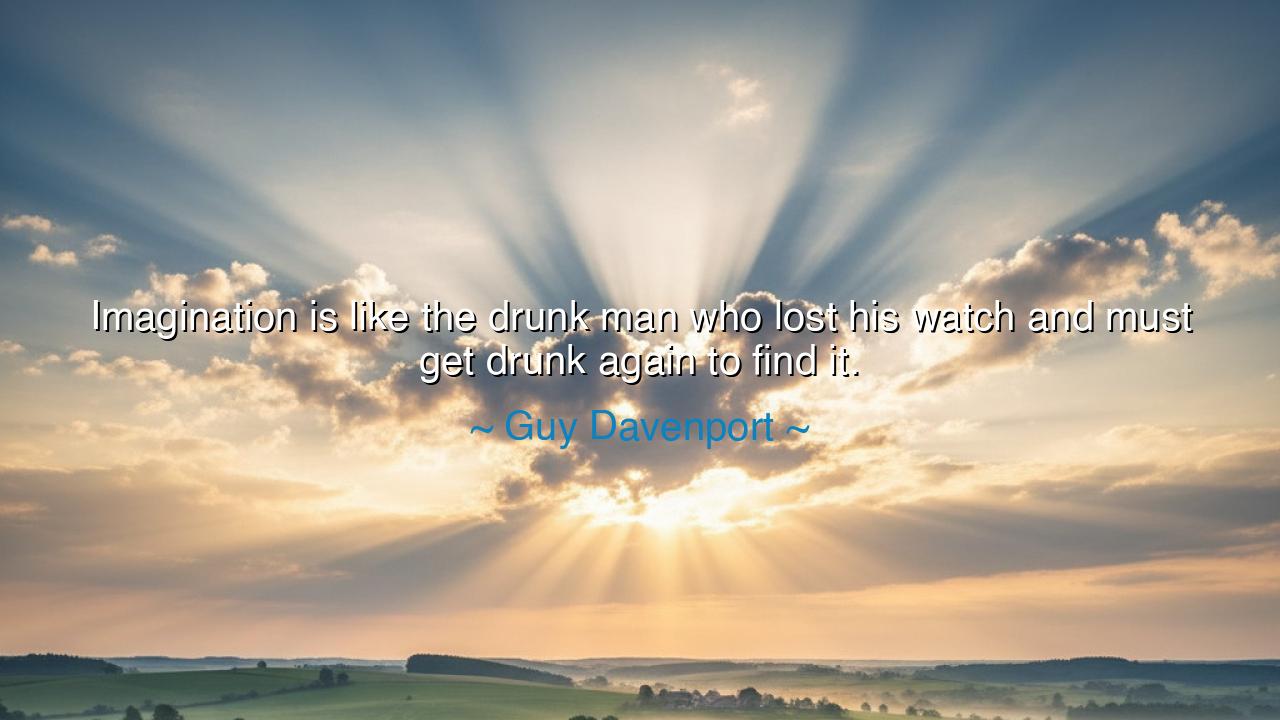
Imagination is like the drunk man who lost his watch and must get
Imagination is like the drunk man who lost his watch and must get drunk again to find it.






In the curious and profound words of Guy Davenport, the poet, scholar, and artist of the mind, there hides a truth both humorous and divine: “Imagination is like the drunk man who lost his watch and must get drunk again to find it.” Though veiled in wit, this line speaks to one of the deepest mysteries of the creative spirit — that imagination, elusive and wild, cannot be seized by logic or controlled by reason. Like a bird startled into flight, it returns only when the seeker surrenders the rigid discipline of the conscious mind and re-enters the sacred chaos from which inspiration first arose.
To call imagination a “drunk man” is not to mock it, but to reveal its nature. The drunk man, freed from the tyranny of structure, wanders — his senses loosened, his inhibitions dissolved. He does not think as the sober think; he sees what the waking mind cannot. In the same way, the artist, the dreamer, or the philosopher must sometimes lose the steadiness of intellect in order to glimpse what reason alone obscures. For imagination is born not in order, but in openness — not in calculation, but in surrender. To “get drunk again,” in the metaphor of Davenport, is to return to that state of divine abandon where creation flows unbidden, where thought becomes vision and vision becomes art.
The origin of this quote lies in Davenport’s lifelong meditation on art, myth, and memory. He saw imagination as the living thread that binds all acts of creation — whether in literature, painting, or the simple wonder of perceiving the world anew. His words echo the wisdom of the ancients, who often saw inspiration as a form of sacred madness. The Greeks spoke of the Muses, divine beings who would “possess” the poet, turning his mind into a vessel for otherworldly truth. Plato himself said that without this “divine intoxication,” no great work of art or philosophy could exist. Thus, Davenport’s “drunkenness” is not the folly of excess, but the blessed delirium of insight.
Consider the story of Samuel Taylor Coleridge, who once dreamed the vision of Kubla Khan. In the haze between sleep and waking, the lines of the poem came to him in a torrent of images and music, and he began to write as if guided by another hand. When a knock at the door interrupted him, the spell was broken — the watch of imagination lost. No matter how he tried to regain it, the rest of the poem would not return. He had been “drunk” with the ecstasy of creation, and once that sacred intoxication passed, the gates of vision closed. Coleridge’s story is the living embodiment of Davenport’s wisdom: when imagination slips from us, we cannot summon it by discipline or will; we must instead find again the state of wonder from which it came.
To the uninitiated, such “madness” may seem dangerous, even undignified. But those who truly understand the creative soul know that this drunkenness is not chaos — it is communion. The artist does not stumble blindly; he dances to a rhythm that the world cannot yet hear. The imagination, when awakened, is a spirit that must be courted, not commanded. It demands that one let go of control — of certainty, of ego, of the illusion of mastery — and return to that primal openness from which all things are possible. Only in that surrender does one rediscover the lost watch, the timeless pulse of inspiration that beats beneath the surface of the world.
Davenport’s metaphor also carries a warning: that imagination, once lost, cannot be recovered by force. The thinker who clings to reason alone becomes like the sober man searching in vain under the lamp post, where the light is brightest but the watch is not to be found. The treasure lies in the dark — in the irrational, the playful, the uncertain. To find it, one must dare to wander where logic cannot guide. The great scientist Albert Einstein once said that imagination is more important than knowledge. Knowledge is limited to what we already know; imagination embraces what we might yet discover. The drunkard’s vision, though blurred to the eye, may see farther into the truth than the clearest sight of the cautious mind.
So, my child, take this lesson to heart: do not fear the strange intoxication of imagination. When the world demands reason, dare to dream. When your creativity feels lost, do not search for it with rigid hands — step again into the realm of wonder, of music, of silence, of play. Read poetry, walk beneath the stars, let your thoughts drift like clouds — and you will find that the watch you lost still ticks within you.
For as Guy Davenport teaches, the key to imagination is not control but surrender. We must lose ourselves to find ourselves again. The drunkenness of the mind is not weakness — it is the return to the source, the blessed madness that allows the soul to touch eternity. And when at last you rediscover your watch — your vision, your voice, your art — you will understand that it was never truly lost. It was waiting for you in the darkness, patient as the heart of creation itself.






AAdministratorAdministrator
Welcome, honored guests. Please leave a comment, we will respond soon